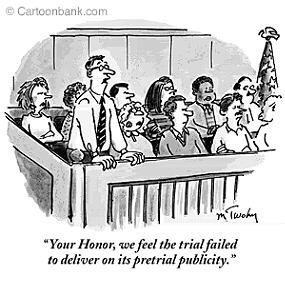Press Leaks and Juror Influence in Criminal Cases
It happens all too often- as you’re following the latest televised celebrity court case, week after you week you get bombarded with all the latest developments. Seemingly out of nowhere, new information hits the airwaves as to the defendant’s alibis; new medical reports confirm that they were indeed drunk, and press reports leak the prosecutor’s statements on the defendant’s culpability.
As you absorb all of this, you ask yourself, “Isn’t this going to influence the case? Will the jury be exposed to this information? Indeed, media reports often do influence criminal cases, sometimes in drastic ways. Some of you may remember the Scott Peterson case. As a result of various media leaks regarding medical reports, people became hostile to Peterson to the point where his case had to be relocated to a different jurisdiction.
Or how about the recent case involving Michael Jackson’s doctor? In that case, the prosecution was accused of leaking evidence in alleged attempts to influence the jury pool. The O.J. Simpson case is another fine example of media influence on jurors. The event was highly televised, and Judge Ito had to remove 4 jurors who had reportedly watched television reports of the case.
So how does the media influence the juror selection process? And when is it okay for prosecutors to issue statements regarding the case? Legally speaking, prosecutors are supposed to abide by official rules that govern professional responsibility and ethics. In dealing with the press, prosecutors are not allowed to issue statements that have a “substantial likelihood of materially prejudicing the case”. But how often is this violated? Doesn’t the media exist to specifically create hype?
Prosecutors are allowed to make certain statements, namely if they are necessary to warn the public, or to protect clients from prejudice. This is understandable, but still, it is hard to draw the line as to what is necessary to “protect” one’s client.
Part of the court’s dealing with the press and media publicity has to do with the jury pool itself. Some jurors are going to be more sensitive to statements and content presented in the media, and so lawyers and judges will be quick to identify and remove such jurors. If the judge suspects that the entire jury was influenced by the media, they will have to make a determination as to whether a retrial is necessary.
A report issued by the Law and Justice Foundation describes four critical stages that can help a judge determine whether the jury’s decision was tainted by media publicity.
- Stage 1: one or more members of the jury actually encountered the media publicity information (either directly or indirectly)
- Stage 2: At least one jury member recalls the information
- Stage 3: the information influences juror perception of the case
- Stage 4: the influence upon the jurors is determinative of their verdict- either by contributing to the verdict or by directing jurors against the weight of evidence
So, if a jury merely encountered some information regarding the case, judges might not be quick to remove them, especially if the information has not spread to other jurors. But if a judge decides that the jurors actually decided their verdict based on media reports, then further remedial steps should be taken.
But I think maybe the problem is that jurors enter into the courtroom already having their own preconceived notions and stereotypes, especially in a criminal case. The average person today has already been bombarded by the media on a daily basis and are already influenced in a broad sense of the term.
Some critics of the U.S. jury system believe that the typical American is infected with what is called “Presumption of Guilt Syndrome”- as a result of watching too many true crime story cable episodes, Americans are quick to label the accused as guilty before even hearing all the evidence.
Others attribute media sensationalism to another syndrome playfully called “Law and Order Syndrome.” This is where jurors come into court with a predisposition to render a death sentence in a capital punishment case. Experts link the syndrome to correlations with crime rates- as crime rates go up, the general public tends to favor capital punishment more. The media contributes to this by issuing more reports on crime and creating more crime T.V. shows, creating a perception in the general public that crime rates have gone up.
Social media is also affecting the jury process. Standard practice for trial lawyers now includes investigating the Facebook and Twitter accounts of potential jurors (yes, this is allowed). Apparently people called for jury duty have been posting their reactions to the trial even before it starts.
So how do we address all of this? Tell people to stop watching T.V. or reading the newspaper? Quite unlikely. I think that maybe what could be of help is to have more information available to the public using the media itself. For example, more informational shows or webcasts on how the jury process works. This would balance out some of the hyper-sensationalized shows on the tube and the web. At least then the jury pool would be somewhat informed rather than being inundated with conflicting messages.
What our clients think
At LegalMatch, we value our client’s opinion and make it a point to address their concerns. You can refer to our reviews page if you want to know what our clients have to say about us.

Comments